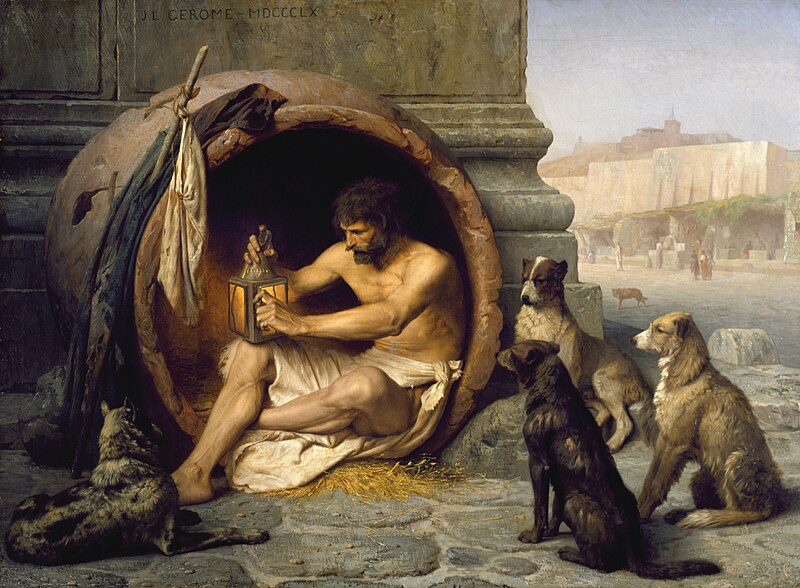by Petrus Tornarius (February 2024)

In 324 BCE, in line with “the notorious requirement of Kea’s constitution that senior citizens not allow themselves to get any older than sixty-five―or seventy at most, if you were a sophist,” the postrationalist poet-philosopher Amalekos of Kea took his own life “at a hemlock social for superannuated geezers” (Guy Samsa, “Amalekos,” Realencyclopädie der Klassischen Altertumswissenschaft, suppl. 37B, app. III, p. 1007; cf. Strabo, Herakleides Pontikos, Claudius Aelianus).
Although widely criticized in the Hellenistic era, this highly effective anti-inflation measure, of which he was himself a prominent supporter, made good economic sense, Amalekos argued, given that “hemlock was very reasonably priced” at the time.
A tantalizing hint in the tenth-century Byzantine Suda encyclopedia suggests, however, that Amalekos may actually not have killed himself but in fact joined a caravan in Babylon bound for the newly established Indo-Greek kingdom of Bactria.
Until it was blown up by militant Pyrrhonists, tourists in Kashmir used to be shown his tomb in Srinagar, when there was nothing else left for them to photograph—although some pedantic Germans objected that it appeared to be built of concrete, invented by the Romans only long after Amalekos’s day.
The actual fate of this remarkable postlogical thinker and bon viveur will probably never be known, but a papyrus scroll found in an urn at the oasis of Oxytocin in Upper Egypt (as my thesis adviser used to say, “The rubbish mounds there are nothing but rubbish mounds, but there’s so much in them that could be recycled!”) records some of his celebrated apothegms, or sayings, translated and annotated here by Scholiastes of Wikipedia:
It’s better to be too clever by half and be thought a fool than to be a fool and thought clever.
If you’re the former, no explanation is needed; if the latter, you’d never understand anyhow!
You can’t paddle twice through the same puddle.
There seems to have been a major drought in the Aegean area at the time. A recently discovered inscription notes that watering one’s asphodels was restricted to just two hours at weekends.
A shaggy ape is best.
A terrible haircut will make even the most sociopathic thug look goofy. Many of the pro-Spartan Thirty Tyrants at Athens in 404 BCE apparently had mullets―and they were soon overthrown.
The razor is a good servant but a bad master.
Even my barber can’t figure this one out! But a good bronze razor cost a fortune in those days―and shaving with obsidian hurts!
In wine is truth.
Alkaeos had said as much around 600 BCE, so this was long passé, and it’s challenged now by K*****’s mot—I’ve just noticed it on one of its six-bottle carrier bags: “Wine is basically fruit salad.” Such “de-essentializing,” as professionals call it, was good for business, however—Amalekos was part-owner of a vineyard on Kea.
The sheep and the shepherd beg to differ.
Probably something to do with local politics. In any case, one is obliged to ask, which is the “Other” here—the sheep or the shepherd?[1]
A drowning man will even grab hold of his own hair.
Baron Münchhausen pulled both himself and the horse he was riding out of a mire by his own hair, thus simultaneously refuting Wittgenstein and Richard Dawkins.
Every shrimp should stay in its own puddle.
Stop it alteady with those inane international conferences. Think of their #@!?&! carbon footprints, for God’s sake!
Hens don’t lay where they cackle.
Don’t believe “influencers” on social media perhaps best expresses this in today’s terms.
Inside every idiot, there’s a genius struggling to get out.
The genius knows he’s a moron, but his mother thinks he’s a genius![2] Still, he’d like to get out more.
They protest too much—and not nearly enough!
Susan Sontag observes in After Explication (1973) that this defies interpretation. But does it really even need it?
[1] See Jacques Derrida, The Ear of the Other: Otobiography, Transference, Translation (Lincoln: University of Nebraska Press, 1985), passim.
[2] “A huge crocodile in whose jaws you are—that’s the mother. One never knows what might suddenly come over her and make her shut her trap,” Jacques Lacan says (The Seminar of Jacques Lacan Book XVII, The Other Side of Psychoanalysis, 1969–1970, trans. R. Grigg, ed. J. A. Miller [New York: Norton, 2007], p. 112).
Table of Contents
Petrus Tornarius is the latinized name of the South African American poet Peter Dreyer—a form often used by some of his medieval German ancestors. He employs this pseudonym to sign poems he thinks “worth publishing, but perhaps a bit infra dig.” Dreyer is the author, among other books, of A Beast in View (London: André Deutsch), The Future of Treason (New York: Ballantine), and Martyrs and Fanatics: South Africa and Human Destiny (New York: Simon & Schuster; London: Secker & Warburg).
Follow NER on Twitter @NERIconoclast
- Like
- Digg
- Del
- Tumblr
- VKontakte
- Buffer
- Love This
- Odnoklassniki
- Meneame
- Blogger
- Amazon
- Yahoo Mail
- Gmail
- AOL
- Newsvine
- HackerNews
- Evernote
- MySpace
- Mail.ru
- Viadeo
- Line
- Comments
- Yummly
- SMS
- Viber
- Telegram
- Subscribe
- Skype
- Facebook Messenger
- Kakao
- LiveJournal
- Yammer
- Edgar
- Fintel
- Mix
- Instapaper
- Copy Link






